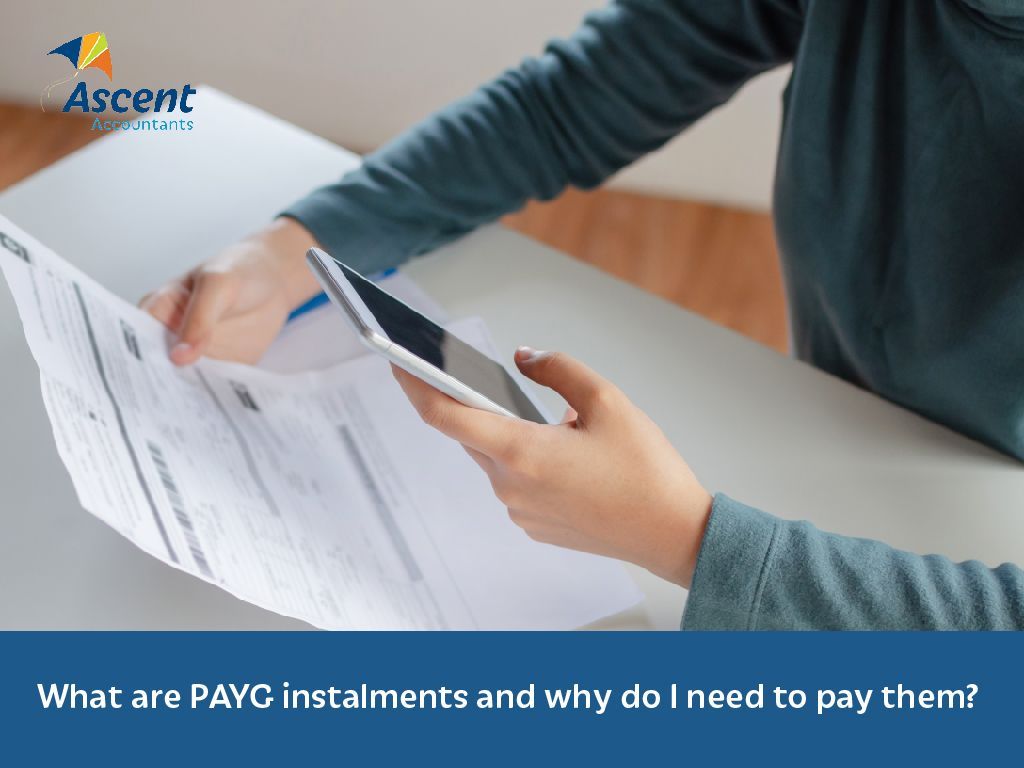PAYG instalments: what is and why do I need to pay them?

What is PAYG?
PAYG (Pay As You Go) instalments are regular prepayments towards the tax on your business and investment income. When it comes time to lodge your return, these advance payments will be credited to your tax liability, reducing the amount you’ll have left to pay.
By understanding your PAYG instalment obligations and making these regular instalments, you’ll be better equipped to manage your cashflow and avoid a hefty tax bill after you lodge your return.
Who must pay PAYG instalments?
Is PAYG mandatory?
PAYG instalments can be voluntary (where you opt in), or your business income may reach the threshold for automatic entry (see below).
- An individual or trust will automatically enter the PAYG instalments system if they meet all of the following criteria:
- Instalment income (gross business and investment income, ex. GST and capital gains) from your latest tax return of ≥$4000.
- Tax payable on your latest notice of assessment of ≥$1000.
- Estimated (notional) tax of ≥$500.
A company or super fund will automatically enter if any of the following criteria apply:
- Instalment income from latest tax return of ≥$2 million.
- Estimated tax of ≥$500.
- The head company of a consolidated group.
Many new businesses or those expecting to make a profit will plan ahead by opting to make voluntary PAYG instalment payments.
Whether voluntary or automatic, you will be notified when you have entered the PAYG instalments system via letter (to your myGov inbox or postal address), or through Standard Business Reporting software or Online Business Services.
How often are you required to pay?
Individuals, superannuation funds and most companies are required to pay in quarterly instalments. The due dates of the instalments fall 28 days after the end of the quarter; this financial year those dates are 28th October (2022), 28th February, 28th April, and 28th July.
How are instalments calculated?
The ATO uses information from your most recent tax return lodged to calculate your PAYG instalments. You may have the option to pay using the instalment amount or instalment rate if they are both shown on your activity statement or instalment notice. Whichever option you choose, your tax liability will be the same.
Instalment Amount
The instalment amount is calculated by the ATO and if you choose this option, you just pay the amount specified. The amount is adjusted to reflect income growth based on changes in Australia’s GDP. Since it’s an estimate of your expected tax liability for the year, your amount will change with new information, like when you vary your instalment amount or lodge a tax return.
Instalment Rate
This is calculated by you from the instalment rate provided by the ATO and your instalment income (gross business and investment income (ex GST)) for the period. The instalment rate uses information from the previous quarter’s tax return. The amount to pay = instalment income x instalment rate.
While your income tax for the financial year won’t change, you may be able to vary your instalments if your financial situation or circumstances have changed, though this may result in interest charges and/or penalties if there is a significant shortfall.
What happens if you don't pay payg instalments?
If you fail to make your PAYG instalments, the ATO will likely charge interest on unpaid amounts, contact you to follow up on payment and use any future refunds or credits to repay the amount you owe. Even if you can’t make payment by the due date, you should still lodge your activity statements and tax returns to avoid a penalty for failing to lodge.
We’re here to help…
Don’t overlook the financial health of your business; consider seeking advice from Perth accountants to help manage your PAYG instalments before they become overwhelming. Ascent Accounting provides a tailored, non-judgemental approach that aligns with your business priorities. Contact us today for more.
Need help with your accounting?








